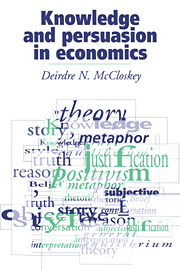25 - The economy as a conversation
Published online by Cambridge University Press: 01 February 2010
Summary
By now perhaps the metaphor of a conversation in economic science is persuasive. The study of science in the past twenty-five years has shown repeatedly that scientists are people arguing in the marketplace of ideas. But the economic actor, too, is a scientist (the Swiss psychologist Jean Piaget was fond of this metaphor). That is, the economy, like economics itself, is a conversation. Such a metaphor is no more strange on its face than the metaphor of the economy as, say, a system of equations in N-space. The test of both comes in the using.
The connection between the economy and the language occurred a century ago to the founder of modern linguistics, Ferdinand de Saussure, a professor at Geneva when Léon Walras was holding forth up the lake at Lausanne. In economic terms, Saussure distinguished between time series and crossection, thus: “Economics … is a science which is forced to recognize this duality … Recent work in [economics] emphasizes this distinction. It is a necessity entirely analogous to that which obliges us to divide linguistics into two parts, each based on principles of its own” (Saussure 1916 (1983), p. 79). Saussure may have had in mind the notorious Methodenstreit between the German historical school (time series) and the neoclassicals (crossection).
- Type
- Chapter
- Information
- Knowledge and Persuasion in Economics , pp. 367 - 378Publisher: Cambridge University PressPrint publication year: 1994
- 2
- Cited by



